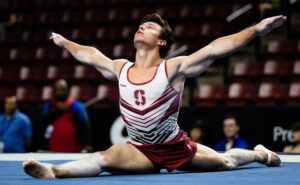Back to: Physical Health Education SS2
Welcome to today’s class!!
We are thrilled to have you in our class!!
In today’s Physical and Health Education class, we will be learning about Gymnastics Floor
Gymnastics Floor

Each skill has a difficulty rating from A through J.
Gymnasts get credit for their eight hardest skills, of which at least three must be acrobatic and three must be dance.
Every routine must include:
- A flip with at least a 360-degree twist
- A double back flip, with or without twists
- Backward and forward tumbling
- Two leaps or hops in succession, either directly connected or with running steps in between. One of the two must involve a 180-degree split.
Floor routines, set to music of the gymnast’s choice (no lyrics allowed), last about 90 seconds and usually include four tumbling passes.
Gymnasts will generally do their most difficult passes first.
Unlike the vault, which is about pure power, the floor exercise combines power with artistry.
Backward Tumbling
Backward tumbling passes start with a roundoff (basically a powerful cartwheel in which both feet land at once), almost always followed by a back handspring to build momentum for the main skill.
The most common passes fall into a few categories:
- Double backs, short for double back flips. Flips can be done in three positions — tuck, with knees bent; pike, with legs straight and hips bent; or layout, with the body straight — but in gymnastics parlance, “double back” refers to the tucked version. The others are specified as “double pike” and “double layout.”
Forward Tumbling
Gymnasts tend to favor backward tumbling because it’s easier to generate momentum from a roundoff and back handspring than from a front handspring. Some excel at forward tumbling, though.
Combination Passes
Gymnasts can increase their difficulty score by doing two skills in one tumbling pass, either directly or indirectly connected.
Direct connections are performed in immediate succession. Indirect connections are performed with a roundoff, handspring or both in between and are described as Skill 1 “through to” Skill 2.
In summary, while participating in Gymnastics, a standard floor mat is about 40 feet by 40 feet, which makes the diagonal paths along which gymnasts tumble about 56 feet. It’s made of foam and carpeting, with springs that allow gymnasts to do difficult skills more safely.
Evaluation
What is the purpose of the Gymnastics Floor?
Reading Assignment
Explain Forward Tumbling in Gymnastics.
Weekend Assignment
Identify any five Gymnasts in the World.
We hope you enjoyed today’s class. In our next class, we will be talking about Backward Roll
Let us know your thoughts and questions in the comment section, and we will attend to them as fast as we can.
